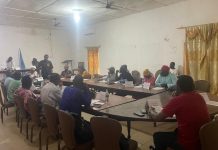By: Kebba AF Touray
The National Audit Office has revealed that the Eco Lodge Project was insufficiently funded at the time of its auditing.
The NAO made this revelation in its management letter on the audit of the eco-tourism camps and lodges.
NAO revealed, “Our review of the bank statement shows a transfer totaling Forty-Four Million Six Hundred and Seventy-Six Thousand Two Hundred and Ten Dalasi (D 44,676,210.00) to Lerr Group being a payment, representing 40% of the total contract price for the construction of five Eco Lodges across the regions, leaving a balance of only Twenty-Eight Million Two Hundred and Sixty-Six Thousand Seven Hundred and Twenty-One Dalasi and Sixty bututs (D 28, 266, 721. 60) in the account which would be insufficient to cover the outstanding balance to be paid to the contractor which is Sixty-Seven Million Fourteen Thousand Three Hundred and Fifteen Dalasi (D67,014,315.00) at the time of writing this report.”
On the inappropriate payment of design and supervision fees to the Project, and a consultant hired by the contractor, the auditors reported that they noted that two tranches of payment transfers totaling four million six hundred and eighty-three thousand two hundred and eighty-three Dalasi (D4, 683,283.00), was made to the Contractor Lerr Group for onward payment to the consultant in respect of design and supervision fees of the project.
On Specifications omitted from the bid document, the NAO said: “A review of the bidding documents revealed that information such as specification and Quantity indicated in the advertisement post for procurement split into lots and bidders required to bid for only one lot was completely omitted from the bidding document.”
The audit also said that they noted a correspondence from GPPA referenced GPPA/GTB/TR 2/18 and dated 21 December 2018 which advised GT Board to divide the construction of the five eco-lodges into lots and restrict each lot to only one contractor for the timely construction of the lodges.
As explained by the office, according to the 2003 GPPA Regulations 42(1), which states, “The invitation to tender shall contain, at a minimum, the following information; and the detailed specification and quantity, and the place of delivery of the goods to be supplied.
It added that further discussions with GPPA officials revealed that the advertisement post is supposed to be an excerpt from the bidding document.
The audit said that the implication of this is that it was misinforming the potential bidders about the terms and conditions of the bidding process, which they said is a violation of GPPA rules and regulations.
The NAO stressed that there is also a risk that certain bidders may be favoured to opt for the actual bidding proceedings and not follow the information stated in the advertisement post.
The NAO recommended that “the GPPA and GT Board provide an explanation as to why the specifications were omitted from the bidding document contrary to the above GPPA Regulation. We recommend that a thorough investigation be carried out to establish the complete facts for awarding the entire lots to one bidder contrary to the letter from GPPA quoted above.”
The management in its response replied that the Bid and Contract documents of the Eco-Tourism Camps were accurately prepared and approved by the GPPA, the regulatory authority as far as procurement of goods and services are concerned.
“Furthermore, the Bidding document contains all relevant information such as the Bill of Quantities, Drawings, and Design that serves as the guide to the Bidders on the nature of the construction of the Eco-Camps,” management added.
According to the management, during the Pre-Bidding conference held on 25 January 2019 for all bidders, there were no such queries from any bidder regarding the technical specifications for the said construction works.
The management said: “Thus your view on ‘The Bid form not tailored to respond to the needs of a construction of Eco-Tourism Camps and Lodges can result in poor work done on the implementation part’ is totally out of context in this situation.”





















